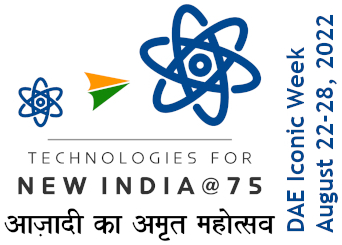J C BOSE MEMORIAL LECTURE: Prof. Mariano Barbacid
Title : Precision Medicine and Cancer : Challenges and Opportunities
Date & Time : 12th February, 2018 at 3.00 PM,
Venue : SINP Auditorium
.png)
Abstract:
Since the discovery of the first human oncogene in 1982, scientists have identified dozens of cancer genes (oncogenes and tumor suppressors) implicated in the development of human tumors. This wealth of information has led to the proposal that selective inhibition of cancer genes or of their downstream signaling pathways will lead to a new paradigm in cancer treatment known as Precision Medicine. Indeed, since 1998, most approved anti-cancer drugs are either small chemicals or biological reagents (mostly monoclonal antibodies) that selectively inhibit the tumorigenic properties of cancer genes. Yet, Precision Medicine has had a limited impact on the overall survival of cancer patients, especially those with advanced or metastatic solid tumors such as carcinomas of the lung, colon and pancreas, glioblastoma, etc.. This is due to the fact that Precision Medicine, albeit conceptually very attractive, has several limitations that have tampered the enthusiasm that initially welcome this initiative. Some of these limitations include (i) the mutational complexity of advanced tumors and the large variety of cancer genes present in each of them, (ii) the fact that many of these cancer genes encode undruggable targets, and (iii) the realization that most advanced tumors are not homogeneous, a characteristic now known as intra-tumoral heterogeneity. I will discuss the inherent difficulties in identifying suitable therapeutic strategies focusing on two of the most common human cancer genes, the TP53 tumor suppressor and the KRAS oncogene.
As an alternative to Precision Medicine, scientists have started to unveil mechanisms to prevent the ability of human tumors to escape immunosurveillance. The identification of the CTLA4/B7 and the PD1/PDL1 immune checkpoints has provided therapeutic tools to successfully treat certain tumor types such as metastatic melanoma for which there were no effective therapeutic options. Yet, these new immunotherapy-based strategies also have significant limitations such as their lack of efficacy in many tumor types, the lack of biomarkers to identify those patients most likely to respond and their high cost. Yet, even considering these limitations, Precision Medicine and Immunotherapy represent critically advances in Oncology that eventually will lead to the successful treatment of those advanced human cancers for which we still do not have suitable therapies.
As an alternative to Precision Medicine, scientists have started to unveil mechanisms to prevent the ability of human tumors to escape immunosurveillance. The identification of the CTLA4/B7 and the PD1/PDL1 immune checkpoints has provided therapeutic tools to successfully treat certain tumor types such as metastatic melanoma for which there were no effective therapeutic options. Yet, these new immunotherapy-based strategies also have significant limitations such as their lack of efficacy in many tumor types, the lack of biomarkers to identify those patients most likely to respond and their high cost. Yet, even considering these limitations, Precision Medicine and Immunotherapy represent critically advances in Oncology that eventually will lead to the successful treatment of those advanced human cancers for which we still do not have suitable therapies.
Profile:
Mariano Barbacid (Madrid, Spain 1949) studied biochemistry at the Universidad Complutense (1966-71) and got his Ph.D. degree from the same university in 1974. From 1974-1978 he trained as a postdoctoral fellow at the National Cancer Institute (NIH) in Bethesda, Maryland working on the molecular biology of murine retroviruses. In 1978 he started his own research group to try to unveil the molecular events responsible for the development of human tumours. His work led in the spring of 1982, to the isolation of the first human oncogene and the first mutation associated with the development of human cancer. These findings, also made independently by two other groups, have been seminal to establish the molecular bases of human cancer. During the following decade (1988-1998), he joined Bristol-Myers Squibb where he became Vice President of Oncology Drug Discovery. There he started the concept of what is now known as Precision Medicine by developing inhibitors against FTase and cell cycle Cdks,among other molecular targets.
In 1998, he returned to Spain to build and direct the Spanish National Cancer Research Center (Centro Nacional de Investigaciones Oncológicas, CNIO). Under his leadership, the CNIO was ranked within the top 15 leading research centres among more than 3,000 research institutions worldwide by the Scimago Institutions Ranking. In 2011, he stepped down as director to concentrate on his own research on the identification and functional validation of therapeutic strategies to treat K-Ras/TP53 driven lung and pancreatic tumors.
In 2012, he was inducted to the US National Academy of Sciences as a Foreign Member and in 2014, he was elected Fellow of the American Association for Cancer Research. He holds three Honorary Degrees from the International University Menendez y Pelayo (1995), University of Cantabria (2011) and University of Barcelona (2014). His work has also been recognized by several international and domestic awards including the Steiner Prize (Bern, 1988), Ipsen Prize (Vienna, 1994), Brupbaher Cancer Research Prize (Zurich, 2005), the Medal of Honour of the International Agency for Cancer Research (Lyon, 2007) and the Burkitt Medal (Dublin, 2017). In 2011 he was awarded an Endowed Chair from the AXA Research Fund (Paris). He is one of the few European scientists to receive two Advanced Grants from the European Research Council (2009 and 2015).
In 1998, he returned to Spain to build and direct the Spanish National Cancer Research Center (Centro Nacional de Investigaciones Oncológicas, CNIO). Under his leadership, the CNIO was ranked within the top 15 leading research centres among more than 3,000 research institutions worldwide by the Scimago Institutions Ranking. In 2011, he stepped down as director to concentrate on his own research on the identification and functional validation of therapeutic strategies to treat K-Ras/TP53 driven lung and pancreatic tumors.
In 2012, he was inducted to the US National Academy of Sciences as a Foreign Member and in 2014, he was elected Fellow of the American Association for Cancer Research. He holds three Honorary Degrees from the International University Menendez y Pelayo (1995), University of Cantabria (2011) and University of Barcelona (2014). His work has also been recognized by several international and domestic awards including the Steiner Prize (Bern, 1988), Ipsen Prize (Vienna, 1994), Brupbaher Cancer Research Prize (Zurich, 2005), the Medal of Honour of the International Agency for Cancer Research (Lyon, 2007) and the Burkitt Medal (Dublin, 2017). In 2011 he was awarded an Endowed Chair from the AXA Research Fund (Paris). He is one of the few European scientists to receive two Advanced Grants from the European Research Council (2009 and 2015).




